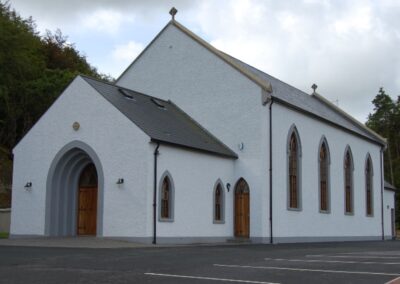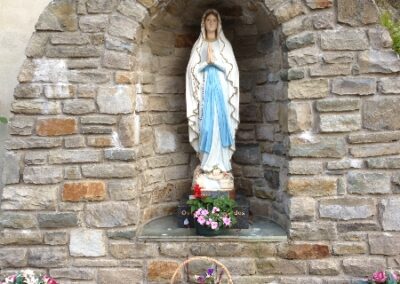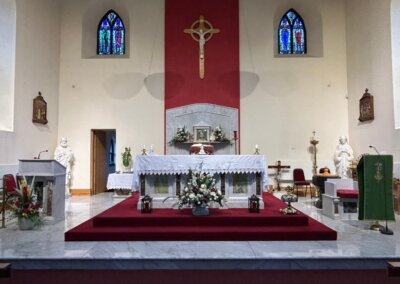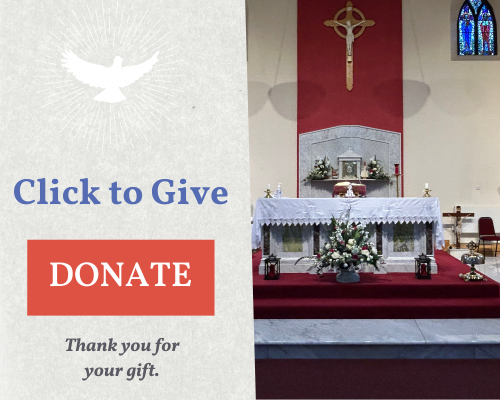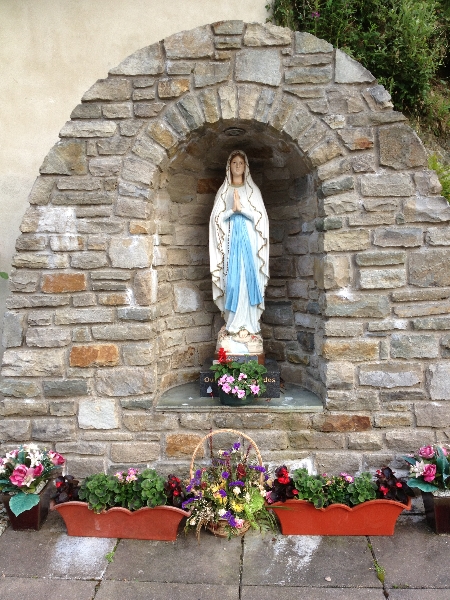donate
newsletter
contact
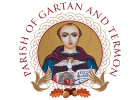
Welcome to The Parish of Gartan & Termon
Céad míle fáilte to our parish website!
Welcome to the Gartan and Termon Parish in the Diocese of Raphoe! Our aim is to make this website an engaging and valuable destination for both parishioners and visitors alike. Whether you’re looking to stay informed about the latest events, services, and activities happening in our Parish, or you’re exploring our community from afar, we hope you’ll find everything you need right here. We are dedicated to keeping you updated on all aspects of Parish life. Additionally, we aspire for all parish and community groups to see this platform as a vital resource for disseminating important information and fostering a sense of connection and belonging among all members.
Nuachtlitir
Raphoe Diocese News
Diocese of Raphoe | Letterkenny | Co. Donegal Activities & Ministries
- Diocesan Appointments 2025by Fr Michael on 07/07/2025 at 11:28
Monsignor Kevin Gillespie, Diocesan Administrator, has announced the following clergy appointments in the diocese to take effect ON... The post Diocesan Appointments 2025 appeared first on Diocese of Raphoe | Letterkenny | Co. Donegal.
- Jubilee Year events in the Dioceseby Fr Michael on 06/06/2025 at 14:32
Timetable for Jubilee of Hope Events. June Sli Cholmcille Creeslough – Gartan 7th June As part our Dicosean... The post Jubilee Year events in the Diocese appeared first on Diocese of Raphoe | Letterkenny | Co. Donegal.
Mass Times

St Colmcille’s Church, Church Hill (Glendowan)
mass – weekdays
Monday: See newsletter
Tuesday: See newsletter
Wednesday: –
Thursday: See newsletter
Friday: See newsletter
mass – Weekends
Saturday: 08.00pm
Sunday: 10.30am
Confessions: After evening Masses on Saturdays and First Fridays
Eucharistic Adoration:
Cemetery Sunday: 1st Sunday of July at 3.00pm
Mass Times

St Columba’s, Termon
mass – weekdays
Monday: See newsletter
Tuesday: See newsletter
Wednesday: –
Thursday: See newsletter
Friday: See newsletter
mass – Weekends
Saturday: 06.30pm
Sunday: 9.00am
Confessions: After all Masses
Eucharistic Adoration:
Cemetery Sunday: 1st Sunday in July
* IMPORTANT*** Mass times may vary throughout the year, so check the Parish newsletter for updates…
Parish Gallery
Please click on the image to view a larger version
THE CHARITABLE DONATION SCHEME
Boost the impact of your contribution. By completing the straightforward 5 year CHY form, we can reclaim tax on your donation, maximising its value by up to 31%. * To qualify a minimum annual donation of €250 is required. More info…
Mass streaming times
St Colmcille’s Church, Glendowan
Welcome to St Colmcille’s Church, Glendowan. May God bless you.
Dé Domhnaigh/ Sunday 10.30am *
Dé Céadaoine/Thursday -7pm *
Dé hAoine /Friday -7pm
Dé Sathairn/Saturday – Vigil at 8pm
St Columba’s church Termon
Welcome to St Columba’s Church,Termon. May God bless you.
Dé Domhnaigh/ Sunday – 9am
Dé Luain/Monday – 9.30am*
Dé Máirt/Tuesday – *
Déardaoin/Wednesday – 9.30am*
Dé Céadaoine/Thursday – *
Dé hAoine /Friday- 9.30am*
Dé Sathairn/Saturday – Vigil 6.30pm
*See newsletter for details of weekday Masses
sacraments
baptism

THE SACRAMENT OF BAPTISM
The Sacrament of Baptism is the most beautiful thing that happens in someone’s life. Did you know that when someone is baptised, it means that God the Father, the Son, Jesus Christ and the Holy Spirit, give the Christian many very special gifts? To be baptised in the Catholic Church means more then being sprinkled with water on one’s head and receiving a Christian name. The word ‘Baptism’ comes from a Greek word that means to ‘plunge’ or ‘immerse’. To ‘plunge’ someone in water represents the person dying, being buried and resurrecting with Christ as a ‘new being.’
What you will need in Preparation for your Child’s Baptism
1) Request for Baptism will only be confirmed when the application form is completed at the Parish Office.
2) A copy of the child’s Birth Certificate is necessary to prove identity.
3) Godparents must be a minimum sixteen years of age.
4) Parents are asked to provide a NEW Baptismal Candle for each child.
5) Where a Baptism is transferred from a different Parish, a letter of permission from that Parish Priest of that Parish is necessary.
Please note that a minimum of 4 weeks notice is required for Baptisms.
Notes for parents – BAPTISM-NOTES-FOR-PARENTS
RECONCILLIATION (CONFESSION)
WHAT IS THE SACRAMENT OF CONFESSION
The Sacrament of Reconciliation is one of the most unique and beautiful aspects of Catholicism. Jesus Christ, in His abundant love and mercy, established the Sacrament of Confession, so that we as sinners can obtain forgiveness for our sins and reconcile with God and the Church. The sacrament “washes us clean,” and renews us in Christ.
“Jesus said to them again, ‘Peace be with you. As the Father has sent me, even so I send you.’ And when he had said this, he breathed on them, and said to them, ‘Receive the Holy Spirit. If you forgive the sins of any, they are forgiven; if you retain the sins of any, they are retained’” (John 20:21-23).
How to Go to Confession
PREPARATION: Before going to confession, the penitent compares his or her life with the Ten Commandments, the Beatitudes, and the example of Christ, asking the Holy Spirit to show them their own particular sins. There are lots of Examinations of Conscience, and even a mobile phone app.
Examinations of Conscience to help you:
Examen for Adults Examen for Older Kids, Examen for Younger Kids
GOING TO CONFESSION: The light above the middle door means that the priest is in. If a light is above one of the side doors, then someone else is there. If neither side light is on – go in, using the side with the screen for anonymous confession or the other for face-to-face.
In the Confessional there is a short guide about going to Confession to help you feel comfortable if you need it, including the Act of Contrition.
Begin by making the Sign of the Cross with the priest and say:
“Bless me Father for I have sinned. It has been (state how long) since my last confession.
These are my sins.”
Tell your sins simply and honestly to the priest. You might even want to discuss the circumstances and the root causes of your sins and ask the priest for advice or direction. You have to confess mortal sins in number and kind as best as you are able. If you want to write them down or use a phone app to help you remember, that is fine. Don’t be afraid – the priest is a sinner too. Don’t be worried – the priest can’t tell anyone what you tell him, as he is in this moment an agent of God’s grace.
When you are finished say: “I am sorry for these sins and all the sins I cannot remember.” The truth is there are usually more. This is also a good way to let the priest know you arent just trying to recollect something else.
Listen to the priest and accept the penance from him. Penances are things we do to begin again, and to show God we are sorry – prayers, reflections or works of charity. Write it down on the back of one of the Act of Contrition copies if you need to.
Pray the Act of Contrition. There are lots of different versions, or you can make up your own as long as it contains the essential elements – sorrow for sin and resolve to sin no more.
My God, I am sorry for my sins with all my heart. In choosing to do wrong and failing to do good, I have sinned against you whom I should love above all things. I firmly intend, with your help, to do penance, to sin no more, and to avoid whatever leads me to sin.
Our Savior Jesus Christ suffered and died for us. In his name, my God, have mercy.
Receive Absolution. The priest will pray the prayer through which your signs are forgiven by the grace of God. Make the sign of the Cross when the priest says, “I absolve you from your sins, in the name of the Father, and of the Son and of the Holy Spirit.”
The priest will then conclude with the words: “Go in Peace”.
You respond: “Thanks be to God.”
The grace of Confession is absolution of sins, as we are also raised up by God’s love and mercy to begin again in His grace.
HOLY COMMUNION
THE HISTORY OF FIRST COMMUNION
Until the thirteenth century, the usual practice was for infants and children to receive First Communion immediately after baptism. This was normally done by administering a drop of Precious Blood to the infant or by the priest dipping his thumb in the chalice and then placing his thumb in the infant’s mouth. At Masses small children were often given the fragments of hosts that were left over after the adults had received Communion.
This practice in the Western Church generally died out by the thirteenth century, and the Eucharist was given only to those who had reached the “age of discretion” and had gone to confession.
First Holy Communion is most often celebrated by children around the age of seven or eight, when they have reached the age of reason and are capable of participating in the sacramental life of the Catholic Church. First Holy Communion is to be preceded by the sacraments of baptism and reconciliation.
FIRST HOLY COMMUNION PROGRAMME REQUIREMENTS
First Holy Communion preparation time is *information* months.
For Children who will be preparing to receive the Sacrament of Penance and First Holy Communion, many programmes feature beautifully illustrated Scripture stories to help introduce the children to the Eucharist in the context of the Mass, and will motivate them to build a firm foundation for their initiation into these two sacraments.
First Holy Communion is normally received at the age of *information*
To be eligible to receive First Holy Communion, children will need to register for the Parish Programme , if the church is a different church in which the child was baptised, you will need to provide a copy of birth and baptism certificate.
To share in Communion for the first time children must have “sufficient knowledge and careful preparation so as to understand the mystery of Christ according to their capacity” (Code of Canon Law 913).
They must also be able to receive communion “with faith and devotion” (Code of Canon Law 913).
Children should understand the mystery of Christ “according to their capacity.” They should come to the table with a spiritual disposition.
“Children must go to the sacrament of Penance before receiving Holy Communion for the first time” (Catechism of the Catholic Church 1457).
Children and their parents are expected to attend Mass frequently (weekly).
Children are expected to attend all preparation classes and complete all course work.
FIRST HOLY COMMUNION RESOURCES
Worksheet 1-2 Download
Worksheet 2-1 Download
Worksheet 3-1 Download
Resource from – www.icatholic.ie
CONFIRMATION
CONFIRMATION IN FAITH
Confirmation, like Baptism and the Eucharist is, is one of the three sacraments of initiation of the Catholic Church. As the Holy Spirit descended upon the disciples who were gathered in the upper room at Pentecost, so the Holy Spirit comes to every baptised person for whom the Church requests the gift of the Holy Spirit. It secures and strengthens him to be a living witness to Christ.
WHO CAN RECEIVE?
Any baptised Catholic wishing to advance on the path of developing their faith. For young people, this is usually part of the 5th/6th class primary school programme. For adults who were not confirmed as children, it means taking part in the Rite of the Christian Initiation of Adults (R.C.I.A.)
SPONSOR
A sponsor stands behind the candidate for Confirmation at the Confirmation ceremony and places their hand on the shoulder of the candidate as a sign that they will support them in living out their baptismal promises. However, the role of the sponsor is not just for one day. The sponsor undertakes to assist the confirmed person in growing in the fullness of their faith and in their membership of the Catholic Church.
A person qualifies as a sponsor by being a reasonably mature adult, who is at least 16 years old, and has already received the Sacraments of Initiation, (Baptism, Confirmation and Eucharist) themselves. The Confirmation sponsor may be one of the people who were a sponsor at Baptism (subject to the notes here).
CHOOSING A SPONSOR
(Ref. Code of Canon Law §874) To be admitted to undertake the office of sponsor, a person must: Be appointed by the candidate, or by the parents or whoever stands in their place, or failing these, by the parish priest or the minister; to be appointed the person must be suitable for this role and have the intention of fulfilling it; be not less than sixteen years of age, unless a different age has been stipulated by the diocesan Bishop, or unless the parish priest or the minister considers that there is a just reason for an exception to be made; be a Catholic who has been confirmed and has received the blessed Eucharist, and who lives a life of faith which befits the role to be undertaken; not be either the father or the mother of the candidate.
NAME
The tradition of taking a new name at Confirmation emphasises the new identity of a Christian being called to witness to their faith. People are encouraged to take the name of a saint or a person from the Bible who inspires them in some way.
OIL
The oil used is called the Oil of Chrism. It is olive oil mixed with balsam that is blessed by the bishop and priests of the diocese in the Cathedral at the ‘Chrism Mass’ on Holy Thursday. The Sacrament is conferred with the anointing with this ‘Oil of Chrism’ on the forehead as the Bishop says ‘Be sealed with the gifts of the Holy Spirit’.
Resources :
Confirmation (short)
A Rite of Passage
Preparation involves everyone
Confirmation (long)
Questions and Answers (Tweeting with God)
Philosophy of Religion
Science and Religion
Religious texts
ANNOINTING OF THE SICK
WHEN WE ARE SICK OR DYING WE MUST FACE THE FACT OF OUR MORTALITY. IN THIS TIME OF DIFFICULTY JESUS DOES NOT ABANDON US.
The parish wish to offer every possible support to you or your loved one who is ill. The Sacraments of Holy Communion, Confession and Anointing of the Sick are a wonderful source of grace and healing and the priests of the parish are happy to visit your loved one who is sick. The Sacrament of Anointing is not only for those who are seriously ill but can be received by the infirm, those in advanced years, or anyone prior to surgery.
The sacrament calls upon God’s healing and loving presence, it brings comfort, peace and courage.
If you wish a priest to visit please contact the parish pastoral office or the priests directly.
EUCHARIST TO THE HOUSEBOUND
Every First *information* of the month, the parish team visit the housebound with Holy Communion. Lay Ministers of the Eucharist are also available to distribute Holy Communion to the sick on Sundays or in time of need. If you or you know of someone who is are unable to attend Mass due to illness or frailty would like to receive the sacraments in your/their home, please contact the Parish Pastoral Office, Tel: Info.
WHAT IS THE SACRAMENT OF THE SICK?
The Sacrament of the Anointing of the Sick is exactly what it says. It is a prayerful celebration for someone or for a group of people who are ill and are blessed by the priest with Holy Oil. It is not a sign that someone is dying as it was perceived in olden times. It is not a magical ritual; the person doesn’t automatically get better immediately after an anointing. God’s healing and loving presence are called upon that the sick person might be raised up and restored to health.
Resources :
Sacrament of Anointing of the Sick – Franciscan Media
Anointing of the Sick – Wikipedia
Caring for the Dying
Spiritual Support for the Dying
Viaticum – Wikipedia
MARRIAGE
MARRIAGE
Marriage is different to most of the Sacraments which are conferred by a priest, or bishop. The man and woman confer the Sacrament of Marriage upon each other when they express their consent to marry before God and the Church.
As a Sacrament Marriage is part of the Church’s liturgy. Jesus taught that marriage is indissoluble: “Therefore, what God has joined together, no human being must separate” (Matthew 19:6). Through the sacrament of Matrimony, the Church teaches that Jesus gives the strength and grace to live the real meaning of marriage. In the writings of St Paul: “Husbands, love your wives, even as Christ loved the church and handed himself over for her to sanctify her” (Ephesians 5:25–26).
There are a number of requirements of both the Church and the State that must be satisfied when proposing to get married in church. The guidelines in this page are offered only by way of assistance – if you have any queries please contact your local parish and / or Civil Registration Office directly.
Firstly, you must contact a priest of the parish / Parish Office to discuss the date of your wedding in a particular church in Moville Parish and make sure that it is available. You must also arrange to meet the priest you are inviting to be the celebrant of your marriage and ensure his availability on the day. Every couple marrying in the Catholic Church is required to give the Church a minimum of three months notice of their intention to marry. However, the Civil Registration Act (2004) requires that all couples must also give three months notice of their intention to marry to a Civil Registrar in person. In order to do this couples must contact a Registrar at a Civil Registration Office beforehand to make an appointment. While only three months’ notice is required by law, couples are advised to contact the Registrar well over three months before their intended date of marriage to ensure they can get a timely appointment. The contact details of the local Civil Registration Office are as follows:
Civil Registration Office, Letterkenny,
Tirconnaill House, Letterkenny, Co. Donegal
Opening Hours : 09.15 – 16.30 Mon-Fri Open Thurs til 19.30
Contact : +353 74 912 3771
HOLY ORDERS
THE PRIESTHOOD AND THE PERMANENT DIACONATE
The Sacrament of Holy Orders is the continuation of Christ’s priesthood, which He bestowed upon His Apostles; thus, the Catechism of the Catholic Church refers to the Sacrament of Holy Orders as “the sacrament of apostolic ministry.”
“Ordination” comes from the Latin word ordination, which means to incorporate someone into an order. In the Sacrament of Holy Orders, a man is incorporated into the priesthood of Christ, at one of three levels: the episcopate, the priesthood, or the diaconate. If you have an interest in finding out more about the path to priesthood or the permanent diaconate in the Archdiocese of Dublin, you are very welcome to contact our Diocesan Vocations Director.
Read more…
Religious Life www.catholicireland.net/orders
FAQ – Holy Orders
What is the sacrament of Holy Orders?
It is the sacrament through which the mission entrusted by Christ to his apostles continues to be exercised in the Church until the end of time.
Why is this sacrament called Holy Orders?
Orders designates an ecclesial body into which one enters by means of a special consecration (ordination). Through a special gift of the Holy Spirit, this sacrament enables the ordained to exercise a sacred powerin the name and with the authority of Christ for the service of the People of God.
What place does the sacrament of Holy Orders have in the divine plan of salvation?
This sacrament was prefigured in the Old Covenant in the service of the Levites, in the priesthood of Aaron, and in the institution of the seventy “Elders” (Numbers 11:25). These prefigurations find their fulfilment in Christ Jesus who by the sacrifice of the cross is the “one mediator between God and man” (1 Timothy 2:5), the “High Priest according to the order of Melchizedek” (Hebrews 5:10). The one priesthood of Christ is made present in the ministerial priesthood. “Only Christ is the true priest, the others being only his ministers.” (Saint Thomas Aquinas)
What are the degrees that make up the sacrament of Holy Orders?
The sacrament of Holy Orders is composed of three degrees which are irreplaceable for the organic structure of the Church: the episcopate, the presbyterate and the diaconate.
What is the effect of episcopal ordination?
Episcopal ordination confers the fullness of the sacrament of Holy Orders. It makes the bishop a legitimate successor of the apostles and integrates him into the episcopal college to share with the Pope and the other bishops care for all the churches. It confers on him the offices of teaching, sanctifying, and ruling.
What is the office confided to a Bishop in a particular Church?
The bishop to whom the care of a particular Church is entrusted is the visible head and foundation of unity for that Church. For the sake of that Church, as Vicar of Christ, he fulfills the office of shepherd and is assisted by his own priests and deacons.
What is the effect of ordination to the priesthood?
The anointing of the Spirit seals the priest with an indelible, spiritual character that configures him to Christ the priest and enables him to act in the name of Christ the Head. As a co-worker of the order of bishops he is consecrated to preach the Gospel, to celebrate divine worship, especially the Eucharist from which his ministry draws its strength, and to be a shepherd of the faithful.
How does a priest carry out his proper ministry?
A priest, although ordained for a universal mission, exercises his ministry in a particular Church. This ministry is pursued in sacramental brotherhood with other priests who form the “presbyterate”. In communion with the bishop, and depending upon him, they bear responsibility for the particular Church.
What is the effect of the ordination to the diaconate?
The deacon, configured to Christ the servant of all, is ordained for service to the Church. He carries out this service under the authority of his proper bishop by the ministry of the Word, of divine worship, of pastoral care and of charity.
How is the sacrament of Holy Orders celebrated?
The sacrament of Holy Orders is conferred, in each of its three degrees, by means of the imposition of hands on the head of the ordained by the Bishop who pronounces the solemn prayer of consecration. With this prayer he asks God on behalf of the ordained for the special outpouring of the Holy Spirit and for the gifts of the Spirit proper to the ministry to which he is being ordained.
Who can confer this sacrament?
Only validly ordained bishops, as successors of the apostles, can confer the sacrament of Holy Orders.
Who can receive this sacrament?
This sacrament can only be validly received by a baptized man. The Church recognizes herself as bound by this choice made by the Lord Himself. No one can demand to receive the sacrament of Holy Orders, but must be judged suitable for the ministry by the authorities of the Church.
Is it necessary to be celibate to receive the sacrament of Holy Orders?
It is always necessary to be celibate for the episcopacy. For the priesthood in the Latin Church men who are practicing Catholics and celibate are chosen, men who intend to continue to live a celibate life “for the kingdom of heaven” (Matthew 19:12). In the Eastern Churches marriage is not permitted after one has been ordained. Married men can be ordained to the permanent diaconate.
What are the effects of the sacrament of Holy Orders?
This sacrament yields a special outpouring of the Holy Spirit which configures the recipient to Christ in his triple office as Priest, Prophet, and King, according to the respective degrees of the sacrament. Ordination confers an indelible spiritual character and therefore cannot be repeated or conferred for a limited time.
With what authority is the priestly ministry exercised?
Ordained priests in the exercise of their sacred ministry speak and act not on their own authority, nor even by mandate or delegation of the community, but rather in the Person of Christ the Head and in the name of the Church. Therefore, the ministerial priesthood differs essentially and not just in degree from the priesthood common to all the faithful for whose service Christ instituted it.
God created man in His own image and likeness… God is love and in Himself He lives a mystery of personal loving communion. Creating the human race in His own image and continually keeping it in being, God inscribed in the humanity of man and woman the vocation, and thus the capacity and responsibility, of love and communion. Love is therefore the fundamental and innate vocation of every human being.
Blessed John Paul II, Familiaris Consortio.
Information & Resources
HOW DO I MAKE AN APPOINTMENT ?
To schedule an appointment with a priest, there are several options available to you. If you prefer to meet with someone in person, you can stop by the church or parish office during their regular hours of operation, which are typically from “add office hours”. Alternatively, you can give us a call at “add phone” or use the contact form on our website. You can also email the Parish Office at “add Email address to request an appointment. When making your appointment, it’s important to provide as much detail as possible about the reason for your meeting. This will allow the priest to prepare appropriately and ensure that you receive the support and guidance you need.
The Parish Office is located – Parochial House, Termon
OPENING HOURS:
Monday, Wednesday & Friday: 10am – 1pm
PARISH SECRETARY:
CONTACT:
Telephone Number: 074 9139016 (Termon), 074 9137057 (Church Hill)
Email Address: gartantermon@raphoediocese.ie
SERVICES AVAILABLE:
Booking of Weddings
Anniversary Masses
Baptism
First Holy Communion
Confirmation
Marriage
Issuing of Marriage Certificates
Issuing of Baptism Certificates
Information regarding Parish events and publications etc.
Contact Details of local Schools
Scoil an tSratha Mhóir
Glendowan,
Church Hill,
Co Donegal,
F92 P280
Principal: Conchubar Ó Fril
Tel: 074 9137454
Email: stramore99@gmail.com
Scoil Cholmcille
Currin, Temon,
Co Donegal,
F92 YC85
Principal: Michael Sweeney
Tel: 074 9139244
Email: principaltermon@gmail.com
SUBMIT A NOTICE FOR THE NEWSLETTER.
To have a notice included in the weekly Bulletin, you can send it to us via email. Please note that all notices must be submitted by 12:00 noon on Thursdays in order to be included in the Bulletin for that week. This ensures that we have enough time to review and include your notice in the upcoming edition. We welcome notices for events, announcements, and other relevant information that may be of interest to our community.
Email notices to: kilmacrenan@raphoediocese.ie
What are the local groups and societies?
- Parish Pastoral Council
- Society of St. Vincent de Paul (SVP)
- Legion of Mary
- Youth Ministry Group
- Choir/Music Ministry
- Eucharistic Ministers and Readers
- Prayer and Bible Study Groups
HOW DO I VOLUNTEER TO HELP IN THE PARISH?
Volunteering in your parish is a great way to give back to your community and help others. Here are some steps you can take to volunteer in your parish:
Determine your skills and interests: Consider what skills and interests you have that could be of use in your parish.
Attend parish events: Attend any parish events or meetings that interest you. This can help you meet other parishioners and learn more about the community’s needs and opportunities.
Complete any necessary requirements: Depending on the volunteer role, you may need to complete certain requirements, such as a background check, training, or certification. Make sure you understand any requirements and complete them in a timely manner.
Remember that volunteering is a selfless act of service, and it is important to approach it with a positive attitude and a willingness to learn and grow.
For more information please contact the Parochial House, Termon on: 074 9139016 or email: gartantermon@raphoediocese.ie
Disabled access
Car parking spaces are available at both churches and there are no steps at the entrance to either church.
safeguarding children
SAFEGUARDING CHILDREN IN OUR PARISH
SAFEGUARDING & CHILD PROTECTION
We in the Parish of Gartan & Termon value and encourage the participation of children and young people in all parish activities that enhance their spiritual, physical, emotional and social development. We recognise the dignity and rights of all children and are committed to ensuring their protection and support. In keeping with this we will work to do all in our power to create safe environments for children and young people in order to secure their protection and enable their full participation in the life of the Church.
Our Child safeguarding Parish Representatives are “Names & Contact details”
How do we safeguard children in our parish?
- We have robust Policy and Procedures in place, please click on: www.raphoediocese.ie/safeguarding or https://safeguarding.ie/policy-guidance/view-all-the-guidance
- A Child Safeguarding Statement is in place which is compliant with the requirement of Children First legislation and has been verified by Tusla’s Complaince Unit, (please ask for a copy), or please click on https://www.raphoediocese.ie/safeguarding-children/forms-policies/#collapse-4591
- All clergy, staff and volunteers working with children must attend Safeguarding Children Training,
- All clergy, staff and volunteers must undergo garda vetting, click here for vetting form: https://www.raphoediocese.ie/safeguarding-children/forms-policies
- Safe Recruitment procedures are in place,
- Parental Consent must be obtained,
- There is a Code of Behaviour for Adults working with Children,
- Supervision ratios must be adhered to by Leaders,
- Sign-in book and attendance records are maintained,
- Child friendly posters are on display,
- Information is made available to parents/guardian should they have a concern,
- Each parish has at least 2 Safeguarding Parish Representatives who work with their Parish Priest to ensure best practice is in safeguarding,
- All child protection concerns are taken seriously and reported to the statutory authorities.
HOW TO REPORT A CONCERN
If you have been abused in the past or have a concern about the welfare and safety of a child, please contact:
Margaret Northage, Designated Liaison Person on 086 2183011 or alternatively you can go directly to the Gardaí or Túsla.
For further information or to view the Raphoe Diocese’s Safe guarding and Child Protection Policy please click here
Very Rev Michael McKeever, PP
Parochial House,
CHurch HIll, Co DOnegal F92H2V6
directions
Get In Touch
*All notices for the Parish Bulletin must arrive by 12.00 noon Thursdays
Weekly Reminder
Signing up for a weekly Parish Bulletin reminder is a simple yet effective way to stay informed, engaged, and connected with your Parish. So why not take a moment to sign up today and see what news, events and opportunities are coming up in your church community.
Find us on Facebook


